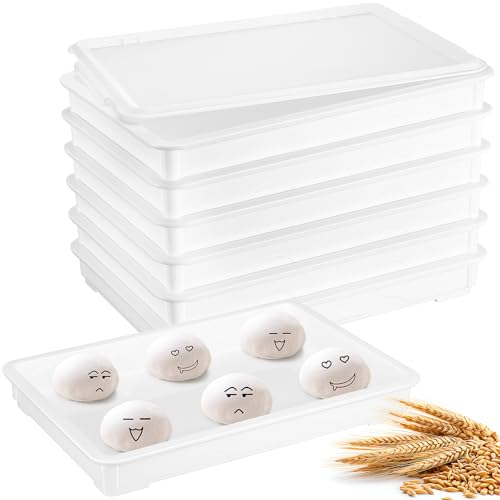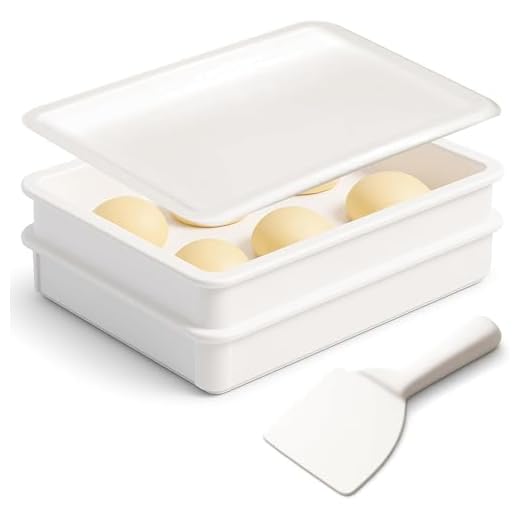



Proofing dough is an essential step in the bread-making process. It allows the yeast to ferment the dough, resulting in a light and fluffy texture. Traditionally, dough is proofed in a warm and humid environment, such as near a sunny window or on top of the oven. However, if you don’t have access to these conditions, you might be wondering if you can proof your dough in a slow cooker.
The answer is yes, you can proof dough in a slow cooker. The slow cooker’s low and consistent heat provides an ideal environment for yeast fermentation. By placing your dough in the slow cooker and setting it to the “warm” or “low” setting, you can create the optimal conditions for proofing.
When using a slow cooker to proof dough, there are a few important things to keep in mind. Firstly, make sure to cover your dough with a damp cloth or plastic wrap to prevent it from drying out. Secondly, be aware of the size and shape of your slow cooker. Ensure that it can accommodate the size of your dough and leave enough room for it to rise properly.
While proofing dough in a slow cooker can be convenient, it’s important to remember that the process may take longer than proofing in a traditional setting. The gentle heat of the slow cooker may slow down the fermentation process, so be prepared to wait a bit longer for your dough to rise. Patience is key when using this method.
In conclusion, if you’re looking for an alternative method to proof your dough, using a slow cooker can be a viable option. With a few adjustments and a little extra time, you can achieve the same results as proofing in a more traditional environment. Experiment and see what works best for you and your dough!
Benefits of Proofing Dough in a Slow Cooker
Proofing dough is an essential step in the bread-making process, as it allows the dough to rise and develop flavor. While most people use a warm area in their kitchen or a proofing box for this purpose, using a slow cooker can offer several benefits.
1. Consistent Temperature: Slow cookers are designed to maintain a steady and low temperature, which is ideal for proofing dough. This consistent heat helps the yeast activate and allows the dough to rise evenly without drying out or becoming too hot.
2. Time-Saving: Proofing dough in a slow cooker can save time, as it eliminates the need for constant monitoring. Once you set the temperature and time, you can let the slow cooker do its job while you attend to other tasks.
3. Space Efficiency: Proofing dough in a slow cooker can be advantageous for those with limited kitchen space. Instead of using a separate proofing box or finding a warm area, you can utilize your slow cooker, which is already a staple in most kitchens.
4. Versatility: Slow cookers come in various sizes, allowing you to proof dough of different quantities. Whether you’re making a small batch for personal consumption or a larger one for a gathering, a slow cooker can accommodate your needs.
5. Energy Efficiency: Utilizing a slow cooker for proofing dough can be more energy-efficient compared to using an oven. Slow cookers require less electricity and produce less heat, making them an eco-friendly option.
| Proofing dough in a slow cooker offers several benefits, including: | |
| – Consistent temperature | – Time-saving |
| – Space efficiency | – Versatility |
| – Energy efficiency |
Overall, using a slow cooker to proof dough can be a convenient and efficient method. It provides a controlled environment for the dough to rise, and it eliminates the need for constant monitoring. So, next time you’re baking bread, consider utilizing your trusty slow cooker for the proofing process!
Time-saving
Using a slow cooker to proof dough can be a time-saving technique for busy home cooks. Traditional methods of proofing dough can take hours, requiring the baker to check on the dough periodically, punch it down, and wait for it to rise again.
With a slow cooker, the proofing process can be more streamlined. Simply place the dough in a greased slow cooker, cover it with a damp towel, and set the cooker to the low heat setting. The controlled temperature of the slow cooker helps the dough rise evenly and consistently.
One of the major advantages of using a slow cooker for proofing dough is that it eliminates the need to constantly monitor the dough. Once the dough is placed in the slow cooker, it can be left to rise for the recommended time without any additional intervention. This can be especially convenient for busy bakers who may need to step away from the kitchen.
Another time-saving benefit of using a slow cooker is that it can be programmed to start proofing the dough at a specific time. This means that you can prepare the dough in advance, set the slow cooker timer, and wake up to freshly proofed dough in the morning.
Overall, utilizing a slow cooker for proofing dough can save a significant amount of time and effort in the baking process. Whether you’re a novice baker or a seasoned pro, this time-saving technique can help you achieve consistent and delicious results without the hassle of traditional proofing methods.
Even and Consistent Heat Distribution
One of the main advantages of proofing dough in a slow cooker is its ability to provide even and consistent heat distribution. This is crucial for achieving optimal rising conditions for your bread or pastries.
Unlike traditional proofing methods, where the dough is left to rise in a draft-free area or a warm oven, slow cookers offer a unique advantage. They are designed to distribute heat evenly throughout the cooking chamber, ensuring that every part of the dough receives the same amount of heat. This helps in achieving a uniform rise and preventing any uneven or dense spots in your finished product.
The slow cooker’s even heat distribution is attributable to its low wattage and the use of a heating element that surrounds the cooking chamber. As the heat radiates from all sides, the dough is enveloped in a warm environment that promotes consistent fermentation and rising.
With this consistent heat distribution, you can expect your dough to rise at a steady and predictable pace, resulting in well-developed gluten structure and a lighter, fluffier texture in your baked goods.
Additionally, the slow cooker’s enclosed environment traps moisture, creating a humid atmosphere that mimics professional proofing cabinets. This moisture retention ensures that your dough doesn’t dry out during the rising process, leading to improved texture and flavor.
Retains Moisture
One of the key benefits of proofing dough in a slow cooker is that it helps to retain moisture. When dough is proofed in a traditional oven, the heat can cause the dough to dry out, leading to a crust that is too hard and dry. However, when dough is proofed in a slow cooker, the moist environment helps to keep the dough soft and hydrated.
This is particularly advantageous for certain types of dough, such as bread or brioche, which require a soft and tender texture. The slow cooker creates a steamy environment that mimics the professional proofing ovens used in bakeries. The trapped moisture prevents the dough from drying out and allows it to rise and develop a light and airy texture.
In addition to retaining moisture, the slow cooker also helps to ensure even proofing. The gentle and consistent heat provided by the slow cooker ensures that the dough rises evenly and at a controlled pace. This helps to prevent any areas of the dough from over-proofing, which can result in a dense and uneven texture.
Conclusion
Proofing dough in a slow cooker has several benefits, including the retention of moisture and the promotion of even proofing. This method can be particularly useful for doughs that require a soft and tender texture. If you want to experiment with different proofing methods, using a slow cooker can be a great alternative to traditional proofing in an oven.
Versatile and Convenient
Using a slow cooker to proof dough offers versatility and convenience for home bakers. With its low and consistent heat, the slow cooker creates an ideal environment for yeast to activate and dough to rise. This method can be especially useful for those who don’t have access to a traditional oven or want to save on energy costs.
The slow cooker’s compact size also makes it a great option for proofing dough. Its small footprint allows for easy storage and doesn’t take up as much space as a large oven or proofing box. This is especially handy for those with limited kitchen space or who prefer a more minimalist baking setup.
In addition, using a slow cooker to proof dough can be a time-saving solution. You can easily set the desired temperature and timer, and then go about your day while the dough rises. This means you can run errands, work, or even get a good night’s sleep while your dough is proofing. No need to constantly check on the rising process or worry about the dough overproofing.
Furthermore, slow cookers often provide the option to keep the dough warm after proofing. This can be useful if you need to delay baking or want to ensure the dough stays at an optimal temperature until you’re ready to use it. You can simply switch the slow cooker to the “keep warm” setting and have peace of mind knowing your dough will be ready when you are.
Overall, the use of a slow cooker for proofing dough offers versatility, convenience, and flexibility. Whether you’re a seasoned baker or just starting out, this method can help you achieve beautifully risen dough with minimal effort.
Enhanced Flavor and Texture
Proofing dough in a slow cooker can result in enhanced flavor and texture in your baked goods. The slow and gentle heat of the slow cooker allows the dough to rise at a slower pace, which can contribute to a more complex and developed flavor in the final product.
In addition, the moisture and humidity created in the slow cooker can help to create a softer and more tender texture in the dough. This can be especially beneficial for breads and pastries that tend to be dry or dense when baked in a traditional oven.
Improved Crust
Slow cooker proofing can also contribute to an improved crust on breads and other baked goods. The moist environment can help to promote a crisp and golden crust, while still maintaining a soft and airy interior.
Uniform Rising
Another advantage of using a slow cooker for proofing dough is that it provides a more even and consistent rise. The gentle heat and enclosed environment of the slow cooker create optimal conditions for the yeast to activate and the dough to rise evenly. This can result in a more uniform texture throughout your baked goods.
Questions and answers
Can I use a slow cooker to proof dough?
Yes, you can use a slow cooker to proof dough. The gentle heat and controlled environment of a slow cooker can help accelerate the rising process of the dough.
How long does it take to proof dough in a slow cooker?
The time it takes to proof dough in a slow cooker can vary depending on various factors such as the type of dough, ambient temperature, and the desired level of fermentation. On average, it can take anywhere from 1 to 2 hours for the dough to proof in a slow cooker.











